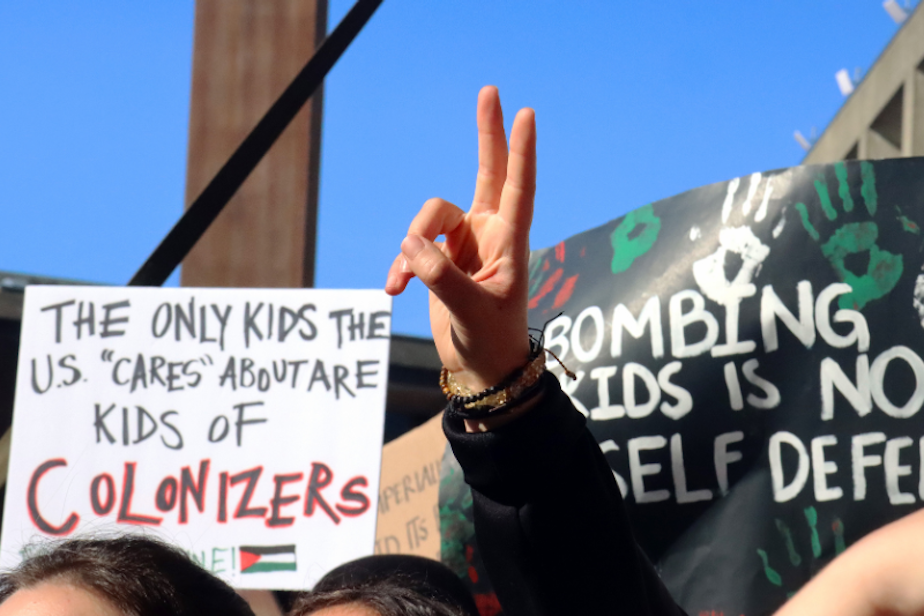Understanding the Hamas-Israel war through history and human rights

Israeli strikes on Gaza continue for the twelfth day following the killing and capture of hundreds of Israeli civilians by Hamas militants.
A wider humanitarian crisis is intensifying in Gaza as approximately one million Palestinians have fled their homes, after Israel ordered people to leave northern Gaza ahead of an expected ground invasion. Israel’s ongoing blockade of the territory has led to extreme shortages of drinking water, fuel, food, and medical supplies.
Three experts on human rights and race, colonialism, and diasporic communities joined Soundside host Libby Denkmann for a conversation about how the war between Israel and Hamas came to this point, as well as the Palestinian civilians caught up in the conflict.
Understanding the roots of the conflict
The violence inflicted on villages in southern Israel last week have been compared to pogroms, atrocities against Jewish people in Eastern Europe and Russia that pushed many to flee and move to Palestine in the late 19th and 20th centuries.
It's important to look at both situations side by side, and see their similarities and differences, said Liora Halperin, a professor of International Studies and History at the University of Washington.
For many Israelis, Hamas’ Oct. 7 attack elicits a strong collective memory, even among Jews who didn't experience the events of the Holocaust in Europe firsthand.
"They felt that it reminded them of those events precisely because the Israeli state was not immediately there to help them; it felt like the state was absent," Halperin said. "In a way, it brought back a memory that they didn't expect to feel. They expected to feel that they were living in a sovereign state whose mission was to protect them."
Halperin said examining the creation of the state of Israel in 1948 is necessary to understand the aspirations connected to Jewish immigration and settlement.
"There's been a lot of news coverage of these particular Jewish communities on the outskirts or this Gaza border area. That was not an area where there was much Jewish settlement before 1948," Halperin said. "But it was an area that the state, after [1948], sought to encourage Jewish residential settlement — often on lands confiscated from former Palestinian residents — in order to house Jewish immigrants, but also to create a kind of residential buffer near the border regions of the state."
Many of those who ended up in these communities, Halperin said, were Jews of lower socioeconomic positions from the Middle East and North Africa. Some Holocaust survivors also settled in these towns.
Amahl Bishara, an associate anthropology professor at Tufts University, said looking at the events of the 1948 War is also essential to understanding Palestinian perspectives.
Bishara estimates that 750,000 Palestinians were displaced to the West Bank, Gaza, and other neighboring countries as refugees due to the war. Palestinians refer to the war as the “Nakba,” which means “catastrophe” in Arabic.
"The trauma and memory of the Nakba and ongoing displacement is also a part of how Palestinians and and human rights experts react, seeing the reoccurring waves of both displacement and violence," Bishara said.
The year 2000 also represents a critical point in the relationship, when peace negotiations between Fatah, the largest faction of the Palestine Liberation Organization, and the Israeli government failed. A Palestinian uprising erupted.
"Ever since, Israeli governments have…taken off the table any negotiation or attempts to resolve the conflict. And likewise, there have been no internationally supported or Palestinian efforts to conflict resolution," Bishara said.
Since then, political powers have transitioned to "conflict management," and Bishara said that Israel's government has pushed to "contain" the conflict rather than resolve it, to promote economic cooperation with other countries and create normalization with the international community.
"We've come to a point where Israelis are living in a sense of having their startup nation being able to exist without relating to the conflict as well. But the startup nation is sitting …on a pile of explosives that could erupt at any moment. And this is what we're seeing right now," Bishara said.
Looking forward
On Sunday, President Biden spoke on CBS about the conflict between Israel and Hamas. He urged Israel not to occupy Gaza again, adding that there needed to be a path to a Palestinian state.
Smadar Ben-Natan, an Israeli human rights lawyer and lecturer at the University of Washington, said that even without discussing possible solutions for conflict resolution between Israel and Palestine, Biden's statement ignored the Palestinian issue.
"Palestinians, who are trying to work through diplomatic channels and through peaceful solutions, are feeling that their agenda is not even acknowledged. So the expressions were completely one-sided without even paying lip service to the Palestinian right to self determination that was acknowledged by the [United Nations] since 1947," Ben-Natan said.
In Gaza, civilians are fleeing and have little to no options to escape Israel’s airstrikes. A humanitarian crisis is mounting as people run out of food and hospitals are overrun. While a long-term political agreement between nations may feel out of reach right now, Bishara said she hopes to see an immediate addressing of what she describes as the “collective punishment" of policies Israel is enforcing upon Palestinians in Gaza.
"We need to see de-escalation of the militarization on all fronts," Bishara said.
But in thinking about the future, Bishara takes hope in the ways communities are trying to provide care for one another, across boundaries and borders.
"Our political leaderships have not provided inspiring visions for peace and justice, but we can see models of community, an air of dignity and of fulfilling some of these basic rights to self determination for Palestinians, and for safety and dignity for all," she said.
Listen to the full interview with Amahl Bishara, Smadar Ben-Natan, and Liora Halperin by clicking "play" on the audio button above.


